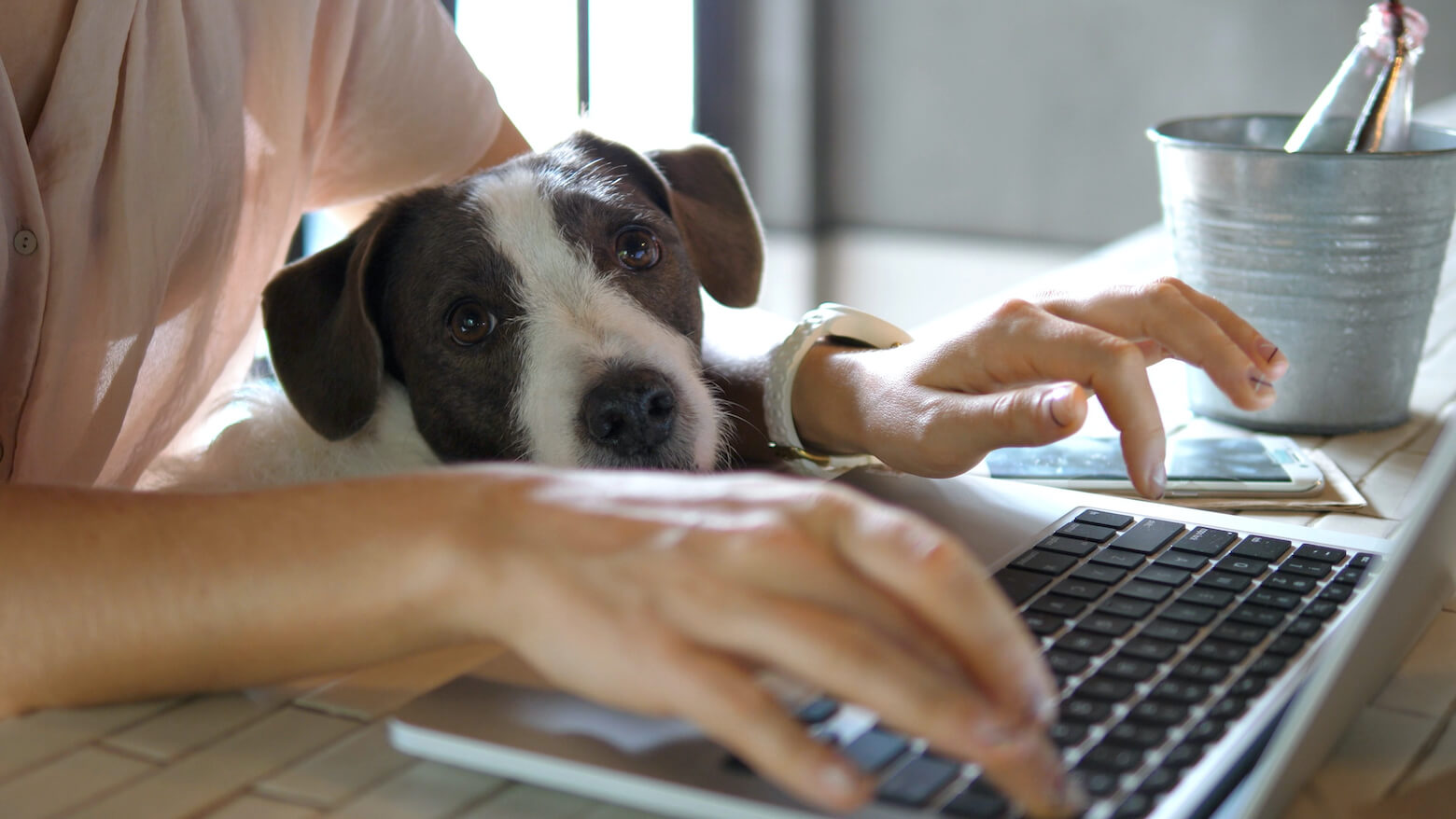As we head into 2021, many things are still uncertain regarding how work will look and feel over the next 12 months. That said, some trends born out of 2020 will undoubtedly impact work-life and team management in the future.
The pandemic and subsequent lockdowns accelerated some already-changing aspects of the modern workforce. Some of them had been bubbling under the surface for a while of course, but aside from the move to collaborative working tech and more emphasis on remote working, what else can we expect from 2021?
1. Hybrid working becomes the norm
The debate over the traditional 9-5 has been rumbling on for years. Seemingly – but not always – older or baby boomer workers have preferred a rigid, office-based work-life. In contrast, millennials mostly have rejected the typical working day in favour of working from anywhere, Frenchie in tow.
Some large organisations, including the Co-op in Manchester City centre, set up lower capacity head office structures many years ago, where workers are expected to work from home several days a week. Although progressive organisations such as this have been moving away from the typical 9-5 in favour of this hybrid approach, many others still preferred bums on seats.
When the pandemic hit and millions of us were forced into lockdown, remote working abruptly became the norm. Any moves towards flexibility and the need for better tech accelerated overnight – and many organisations that have, until now, feared the change were given the final push required into this new way of working.
Most forward-thinking creative, marketing and PR agencies already had flexible working models, but there are still challenges. For example, brainstorming creative ideas and pitching just isn’t the same over Zoom, there’s a definite energy to being in a physical space and being able to read the room!
The case for hybrid working is a compelling one. According to the CIPD, remote working means more engaged employees, which potentially could generate 43% more revenue and improve performance by 20%. On top of this, absenteeism is reduced, and mental wellbeing is improved.
If that’s not enough, there is also a large and very positive environmental impact on more remote working, including fewer greenhouse emissions due to reduced commuting and less paper use. During the COVID-19 pandemic, Breathe London data showed that emissions reduced 25% during the typical morning commute and 34% during the evening commute in our nation’s capital.
For some corporate and let’s say ahem, more archaic businesses, this massive shift in how we work has been a more significant challenge. Still, all companies will have to embrace a hybrid of remote and office-based working as employees demand more flexibility and a better way of life in 2021.
2. Freelance support will rocket
Many creative industries have been well ahead of the curve for hiring freelance talent and have been tapping into this agile support network for some time.
Since the COVID-19 lockdowns, a growing number of companies – large and small – have been looking for more flexible ways to operate due to the unsteady climate. Taking advantage of flexible freelance support enables businesses to work in a more cost-effective way – but much more than that, it allows them to attract talent from all over the globe that wouldn’t have been accessible to them in the past. They can add critical skills and expertise to projects and campaigns and bring in new skills as and when they need them.
This is excellent news for the nation’s growing army of freelancers – who, as well as being talented, are also flexible, resilient, and adaptable – all attractive qualities in the current climate. They can ride out the chaos and uncertainty better than most, making them an appealing option for small and large businesses alike.
Marketing, digital, and creative sector freelancers have already seen growth – this recent Forbes article looked at the sector’s opportunities over the next few years.
3. Productivity wins over presenteeism
There has been a clear shift over the last few years to a more productivity-based workforce, as more and more employers started to question the link between presenteeism and output.
Pre-pandemic, data from Vitality revealed that the UK economy lost almost £92 billion in 2019 due to ill-health related absence in the workplace, with businesses losing 38 working days per employee to physical and mental health-related absence in that one year alone.
With statistics like this, it’s clear that there is a need to judge people on the work they produce rather than the length of time they spend sitting at their desks.
A study by Internet provider Talk Talk found that 58 % of the UK’s workers have reported that they have been more productive while working from home during the first COVID-19 lockdown. And, although most employees and freelancers understand the productivity benefits of working from home, a CIPD survey of 1,046 employers and businesses indicated that 28% of them believe that homeworking has actually increased productivity and efficiency in their employees, rather than reducing it.
4. Country life becomes more attractive
COVID-19 has diluted the obvious appeal of city living. With the cultural and social aspects of urban life temporarily halted or diminished, the “work hard, play hard” office-based lifestyle has been altered irrecoverably.
With many rural areas claiming lower property prices than inner-city suburbs, more people are now looking to the countryside for a more wholesome and outdoorsy way of life.
COVID-19 accelerated the need to work remotely and many people have found working from their home office or kitchen table a challenge if there is no access to a garden or green space. Moving to a more rural or suburban location is suddenly far more appealing than ever before, this trend could continue well into the future.
This shift has been backed up by a YouGov poll, conducted exclusively with The Independent, which found that many people of varying ages and property statuses were considering moving further afield due to the rise of remote working.
5. Wellbeing becomes the priority
The first COVID-19 lockdown had several effects on the wellbeing of the nation and it’s very fair to say that 2020 has had a negative impact on anxiety and mental wellbeing. A recent survey by the ONS of more than 3,500 people found that one in five adults had experienced depression since COVID-19 took hold, compared with one in 10 prior to the pandemic.
On the flipside, a study by Project Instant Insight Polls found that 53% of people agree lockdown has had a positive impact on fitness levels, with 58% doing more exercise as a result. Further research by Hearst Instant Insights found that 38% of people have actually created a health and wellbeing space at home since the first lockdown.
Luckily, remote or hybrid working means that more of us can make wellbeing a priority for 2021, and setting wellness goals to improve health and happiness will become the norm. This is backed up by a study by Mintel on managing stress and mental wellbeing, which found that more than one third of adults are now paying more attention to their mental health compared to a year ago.
For creative industry managers, this can only be a good thing because happy workers are bound to be more productive and creative! A recent story by HR News reported that 60% of employees believe that remote working is having a positive impact on their mental health and wellbeing so employers are likely to continue flexible working arrangements
6. Work wellness and motivation coaching
With motivation, morale and wellness high on the agenda after a tumultuous year, expect to see the rise of work wellness sessions, with bosses bringing in coaches (either in person or remotely) to help employees feel more able, positive and focused.
It makes economic sense for business owners to make sure their workforce is happy and engaged, and employing the skills of experts can make a huge difference if you’re not sure where to start.
On top of this, if businesses are operating a hybrid system where workers are expected to be office-based some of the time, making those spaces calmer and happier will also be high on the agenda.
We also predict a trend in business owners investing in the office space to make it a more inspiring and attractive environment as an incentive for staff to go in versus being in the comfort of their own home.
Merry Christmas from Purple Riot and here’s to a better 2021. If you’d like to talk to us about PR or marketing support, we’re working until 23rd December so please get in touch on 0161 706 0534 or contact us here.

